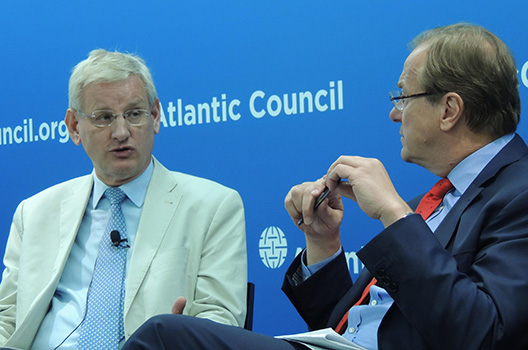 During his July 8 visit to the Atlantic Council, Swedish Foreign Minister Carl Bildt declared that “these are not easy times” for the transatlantic partners, as they face “a more assertive China,” new areas of terrorism threatening Africa, and a Middle East “engulfed by new sectarian divisions.” Speaking to a packed audience of foreign policy experts, scholars, diplomats, and media, Bildt singled out a revisionist Russia as a particular threat to Western values and security. While, on the centennial of the First World War, the world is “not sleepwalking into disaster,” the United States and Europe must remember the lessons of 1914 in addressing the challenges confronting the transatlantic community.
During his July 8 visit to the Atlantic Council, Swedish Foreign Minister Carl Bildt declared that “these are not easy times” for the transatlantic partners, as they face “a more assertive China,” new areas of terrorism threatening Africa, and a Middle East “engulfed by new sectarian divisions.” Speaking to a packed audience of foreign policy experts, scholars, diplomats, and media, Bildt singled out a revisionist Russia as a particular threat to Western values and security. While, on the centennial of the First World War, the world is “not sleepwalking into disaster,” the United States and Europe must remember the lessons of 1914 in addressing the challenges confronting the transatlantic community.
Bildt, who has served as Sweden’s foreign minister since 2006, has been an active player in the European Union’s efforts to diffuse the Ukraine crisis since February. Alongside Germany’s Frank-Walter Steinmeier and France’s Laurent Fabius, Bildt helped secure the February 21 agreement that nearly ensured a peaceful political transition in Kyiv. Nevertheless, following Ukrainian President Viktor Yanukovych’s violation of the settlement and subsequent Russian intervention against its neighbor, Bildt has worked to uphold Ukrainian sovereignty and deescalate the situation.
On Tuesday, Bildt reiterated the importance of the principles laid out in the Charter of Paris of 1990, which enshrined each nation’s right to choose its own future, to resolve disagreements through dialogue, and reject the alteration of borders through force of arms. The West has steadfastly supported an international order based on these pillars, and will maintain them despite the Russian Federation’s actions.
Bildt emphasized a few key points in his remarks:
- The transatlantic partners have long opposed the unilateral alteration of borders, regardless of individual circumstances, including in the Balkans in the 1990s, Georgia in 2008, and even in Russia during the Chechen Wars, despite the transatlantic community having been “often horrified by the conduct of Moscow’s forces as they tried to put down Chechen calls for self-determination and independence.”
- There should be a conscious rejection of the practice of accepting historical rationales for the redrawing of borders. Bildt noted that the only other case in modern history in which a regime suddenly annexed another State by military force with a historical justification was Saddam Hussein’s invasion of Kuwait in 1991.
- It is important to recognize that an ethno-national basis to force changes in borders would open up Europe “for the blood to start flowing again.”
- EU leaders need to acknowledge that “this is a crisis initiated and driven by Russia” in an attempt to derail certain nations from choosing their own future.
- A reaffirmation of the European Union’s commitment to economic and governmental reforms in Ukraine is particularly necessary, as “building a democratic, stable and successful Ukraine is the single most important contribution we can make to counter the revisionist danger that is now threatening in the eastern part of Europe.”
